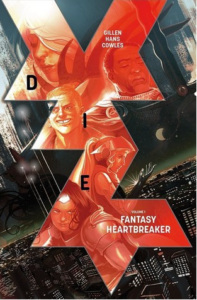This was the first of the Hugo-nominated graphic stories I picked up for review and wow, inject it straight into my gamer veins! Immediately after finishing, I emailed my favorite former Dungeon Master and sent him the link to the first issue, just in case he hadn’t read it already. Any book I immediately want to evangelize after reading is a straight up 5-star read.
 I actually walked into Die without much preamble. For being an old-school comic nerd, I couldn’t name off the top of my head any of Kieron Gillen’s work, but knew vaguely of him. The accompanying book blurb described Die as roleplayers getting sucked into a fantasy world a la the D&D cartoon, and I thought that sounded fun. So I was a bit “yeah, yeah, whatever” with the opening pages, which are drab and glum, both in story and art. But then Sol starts handing out dice, and RPG nerd that I am, I was hooked by the creativity of the character classes (even as I was vaguely repulsed by the Savage-Worlds-like system. Shut up, I love rolling lots of dice.) A few pages more, however, and I realized that the drab art till then had been a conscious choice to better delineate mundanity from the game world, a suspicion confirmed in one of the many thoughtful afterwords regarding the design of this comic.
I actually walked into Die without much preamble. For being an old-school comic nerd, I couldn’t name off the top of my head any of Kieron Gillen’s work, but knew vaguely of him. The accompanying book blurb described Die as roleplayers getting sucked into a fantasy world a la the D&D cartoon, and I thought that sounded fun. So I was a bit “yeah, yeah, whatever” with the opening pages, which are drab and glum, both in story and art. But then Sol starts handing out dice, and RPG nerd that I am, I was hooked by the creativity of the character classes (even as I was vaguely repulsed by the Savage-Worlds-like system. Shut up, I love rolling lots of dice.) A few pages more, however, and I realized that the drab art till then had been a conscious choice to better delineate mundanity from the game world, a suspicion confirmed in one of the many thoughtful afterwords regarding the design of this comic.
First and foremost, this is a brilliantly designed world, that took Mr Gillen and Stephanie Hans over two years to create. The artistic choices are deliberate, intelligent and, when they need to be, spectacular. I honestly can’t think of an artist who could possibly have done better by Mr Gillen’s story than Ms Hans. Which, in itself, is a hell of a thing. As for the story, six teenaged friends are physically pulled into the magical setting they’ve just begun roleplaying. Two years later, only five of them return. Twenty-five years later, a mysterious package causes them to assemble once more, in hopes of finding a way to save their lost friend. But they’re all older, wiser and infinitely sadder, and reading of their trials is both a mindfuck and a heartbreak.
I don’t want to give away too many plot details because they’re so absurdly wonderful, but there are deeply meaningful references throughout to the history and psychology of fantasy and gaming. As a thinking gamer, this combination of intelligence and sensitivity pierced me to the core. I do get the impression that if you’re not into roleplaying games, you might not feel this book as profoundly as a gamer would, which only makes me wish everyone knew how to imagine-with-rules.
This was a really strong start to the 2020 Hugo Awards Graphic Story category. It’s got me really excited for the rest of the selections now, too!

1 ping
[…] first volume of this outstanding homage to RPGs absolutely broke my heart. It was my favorite for last […]